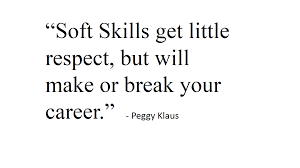Soft skills are often thought of as productive personality traits that empower individuals to influence one’s relationships in social, emotional, and even spiritual ways. Soft skills is an umbrella term for three vital functional elements: people skills, social skills, and personal career attributes. These skills are best understood as different aspects of a person’s effectiveness and influence.
“People Skills” are patterns of behavior and interactions. It is an umbrella term for skills under three related abilities: personal effectiveness, interaction, and intercession skills.
Social skills are interaction skills, including social graces, communication abilities, language skills, personal habits, cognitive or emotional empathy, time management, teamwork, and leadership traits.
“Soft Skills” is another umbrella term for three vital functional elements: people skills, social skills, and personal effectiveness.
Intercession skills are like interaction skills, but they specifically apply to situations where the people involved have interests or perspectives at odds with each other. Resolving these differences requires empathy, patience, and the ability to negotiate a solution that all parties can accept.
By working on personal effectiveness, employees get a better understanding of their talents. They learn to use these optimally. They also see which skills they lack and need to develop to achieve their goals.
Soft skills are essential because they are not restricted to a specific field and can be used in every aspect of people’s lives. Soft skills make people flexible in a world that keeps changing.
In today’s world, soft skills are a significant differentiator for employability and success in life. Still, a 2019 Society for Human Resource Management survey found that three-quarters of employers have difficulty finding graduates with the soft skills their companies need.








